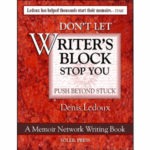How to End Writer’s Block
A low point of memoir writing could often be labeled “writer’s block” Like all long term projects (think raising a family or starting a business or going to college), writing a memoir will have its high points and its low ones. The high points are not difficult to negotiate. They take care of themselves. But, the low periods are challenging. What to do when you are tired of the project and ready for it to be all finished and you are far from finished?
Here are some brainstorming ideas to end writer’s block. I have to list them one after the other but this order is not necessarily my implication of importance. It’s just the numerical order imposes itself. This is not a ranking.
1. Forget writing the next thing on your list and jump into any scene or vignette that still interests you. Feel the excitement that may be there. Keep writing in this follow-the-heart way. How it will fit in is a decision to make later. Ask yourself: Am I writing in a “should” manner? An alternate of this is to have another writing project that you can switch to-or several projects.
2. Work as a professional writer does. All writers are artists but sometimes it is useful to stop thinking of one’s self as inspired by the muse. The plumber does not wait for inspiration to do plumbing. Nor, should the writer. It’s time to go to work, the plumber goes to work. It’s time to write, the writer writes. The plumber, of course, has the external pressure of the homeowner waiting for him and of the family at home needing his paycheck to keep the home going. The writer does not have these motivations. So…if this works for you, set yourself up with some external prodding. A deadline for a contest, a time when you told someone you would deliver the story for her to read, or simply a time inscribed on your calendar by when you promise yourself you will have done X amount of writing.
3. Take some time out—consciously. Schedule non-writing time—brief or significant— rather than slip into a break passively—as in procrastinating. This is likely to give you the feeling of control over your writing life. During this break, read memoirs or articles that a similar to your topic. Let yourself be energized.
4. Practice a little zen. You feel like writing: you write! You don’t feel like writing or maybe you have a touch of writer’s block: you write anyway. Feelings are like clouds in the sky. They can darken everything, but if you wait, they will go by and the sun will shine once again. It is often best not to take some of our feelings too seriously.
5. Honor that discipline is transformative. The application of your energy, sensibility, and abilities to a project over time will transform you in some way. Invite transformation into your life by maintaining your discipline. Working with a writing buddy or a coach can make all the difference in “keeping your nose to the grindstone.”
6. Is your health and energy at its best? Are you getting enough sleep? Eating well? Exercising? Socializing? All of this can affect your attitude about your writing and could potentially end or create writer’s block.
Don’t Give in to Writer’s Block
Like any other conundrum you are in, you should find a solution that best suits your own personal qualities; writer’s block is no different. Search out an end to your writing slump and take action toward your literary accomplishment.
In my book, Don’t Let Writer’s Block Stop You, you will understand the difference between the two sorts of writers and you will learn to be the sort of writer that springs back—applying best practices that every writer can learn to use. Click here to order.
 What would happen to the memoir conversation if…
What would happen to the memoir conversation if…
- …you took a moment to present this informative post to your friends and family by linking this article on your social media? Just a click. It’s so easy.
- …you reposted this article on your own blog or website? It’s free and you’d both have some valuable content to boost your blog’s reputation and you would be providing your readers with valuable guidance. For the best procedure on how to do this, click here.
- …you subscribed to our YouTube channel?


Leave a Reply
You must be logged in to post a comment.